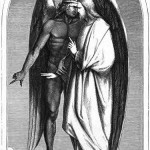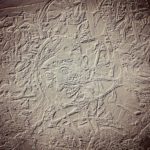We run our website the way we wished the whole internet worked: we provide high quality original content with no ads. We are funded solely by your direct support. Please consider supporting this project.

Does the Lord “Devastate” the Earth?
There is this passage that has sometimes been labeled “Isaiah’s Little Apocalypse” that proclaims how the Lord will “lay waste,” “destroy,” and “ruin” the earth. (The following builds on this previous post which identifies a dual speech pattern of God). It begins with:
The LORD is going to lay waste the earth
and devastate it;
he will ruin its face and scatter its inhabitants (24:1).
Isaiah goes on to decry that “the earth will be completely laid waste and totally plundered” (Isa 24:3) because it has been “defiled by its people” who “have disobeyed the laws” and “broken the everlasting covenant” (vs. 5). Isaiah declares that “a curse consumes the earth” and “its people must bear their guilt” (vs. 6). When free moral agents fall, all that is under their authority falls with them.
Thus far a reader would be justified in assuming that the Lord himself was going to bring about the massive destruction Isaiah speaks of. We get a very different impression, however, if we continue reading, for we soon discover how the Lord planned on bringing about this curse. Relying on the typical ANE conception of anti-creational forces as hostile waters, and using language that is reminiscent of the reversal-of-creation flood account in Genesis, Isaiah proleptically declares:
The floodgates of the heavens are opened,
the foundations of the earth shake.
The earth is broken up,
the earth is split asunder,
the earth is violently shaken (Isa 24:18-9).
These passages indicate that way Yahweh curses the earth is simply by removing the protection (the “floodgates”) that had previously kept hostile cosmic forces at bay. And it is important to notice that, while Yahweh allows these forces to carry out their malevolent designs as a consequence of people’s rebellion, there is no suggestion in this or any other passage that God wanted these forces to be the way they are or that God causes these forces to engage in this destructive activity. To the contrary, Isaiah immediately adds that, once this judgment is complete, Yahweh will “punish the powers in the heavens” and will once again “shut them up” in a “dungeon” and a “prison” (vs. 22).
Just as we have seen God does with violent kings and wicked nations, the sovereign God makes wise use of evil agents as he finds them. But we must never misinterpret God’s willingness to use wicked cosmic forces, wicked nations, and violent kings as indicating his approval of their violence. For as God does in this passage, and as we have seen him do throughout Scripture, once God is done allowing these agents to carry out their destruction, God turns around and punishes them for being the kind of agents he could use for this purpose.
In any event, though it is clear that Yahweh judges the earth in Isaiah 24 by merely withdrawing protection, Isaiah nevertheless depicts him as actively cursing the earth. This passage thus illustrates once again the dual speech pattern that we’ve been discussing. Reflecting his culturally conditioned mindset in which ascribing violence to God was considered the highest form of praise, Isaiah depicts Yahweh doing what in in truth merely allowed.
Photo credit: _Hadock_ via Visual Hunt / CC BY-NC-ND
Category: General
Tags: Cruciform Theology, Judgment
Topics: Interpreting Violent Pictures and Troubling Behaviors
Related Reading

What Does Spiritual Warfare Have To Do with the Cross?
Last week, we covered a few posts on the nature of the Atonement and the Christus Victor view. The following continues this theme, specifically looking the motif of spiritual warfare and how it relates to Christ’s work on the cross. This is an adaptation from Greg’s article in The Nature of the Atonement: Four Views. …

Podcast: Does a Jesus-Centric Theology Reduce God?
Greg challenges the traditional starting point of many theologies and defends starting our theology about God’s nature and character with what has been revealed about Jesus. http://traffic.libsyn.com/askgregboyd/Episode_0325.mp3

Does Paul Condone Vindictive Psalms? A Response to Paul Copan (#1)
In a recent paper delivered at the Evangelical Theological Society, Paul Copan raised a number of objections against my book, Crucifixion of the Warrior of God. This is the first of several blogs in which I will respond to this paper. (By the way, Paul and I had a friendly two-session debate on Justin Brierley’s…

The Ultimate Goal of Life & What Stands in the Way of It
What is the point of it all? What is the highest good? What is the point of life? Greg addresses these huge question in this sermon clip, where he introduces the idea of the beautific vision. The point of everything is to enjoy loving God in his is enjoying and loving us. But of course…

The Revelation of God in the Cross
The cross cannot be understood apart from the resurrection, just as the resurrection can never be understood apart from the cross. They are two sides of the same coin. If you consider the cross apart from the resurrection, then the crucified Christ becomes nothing more than one of the many thousands of people who were…

Podcast: Does the Cruciform Hermeneutic Sabotage Open Theism?
Greg plays Peek-a-Boo with God and considers whether those verses Open Theists use to support Open Theism might simply be times when God is accommodating for us. http://traffic.libsyn.com/askgregboyd/Episode_0236.mp3
